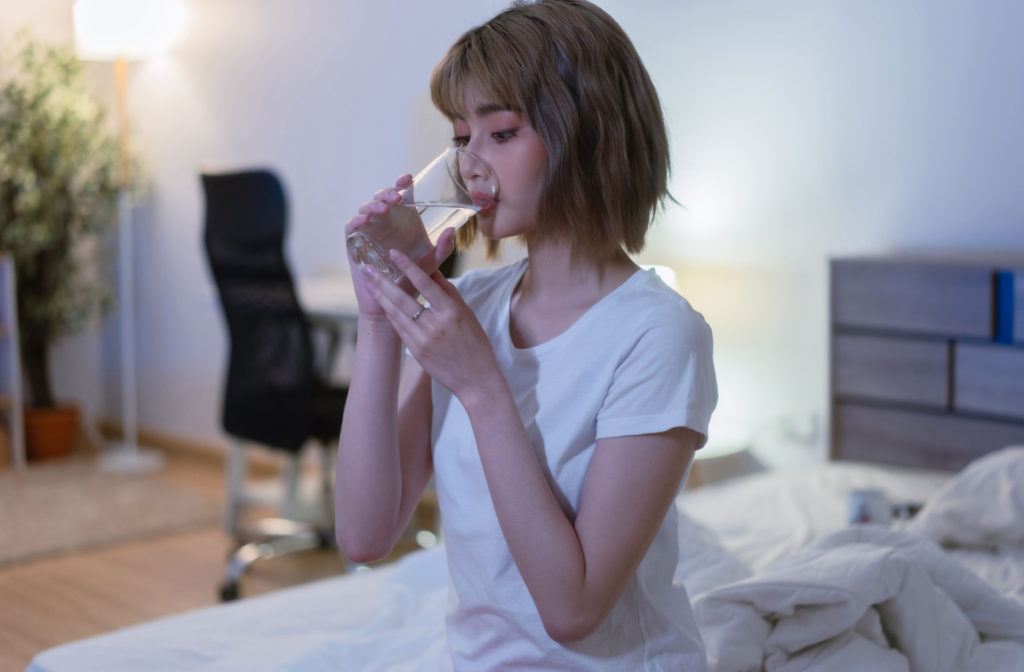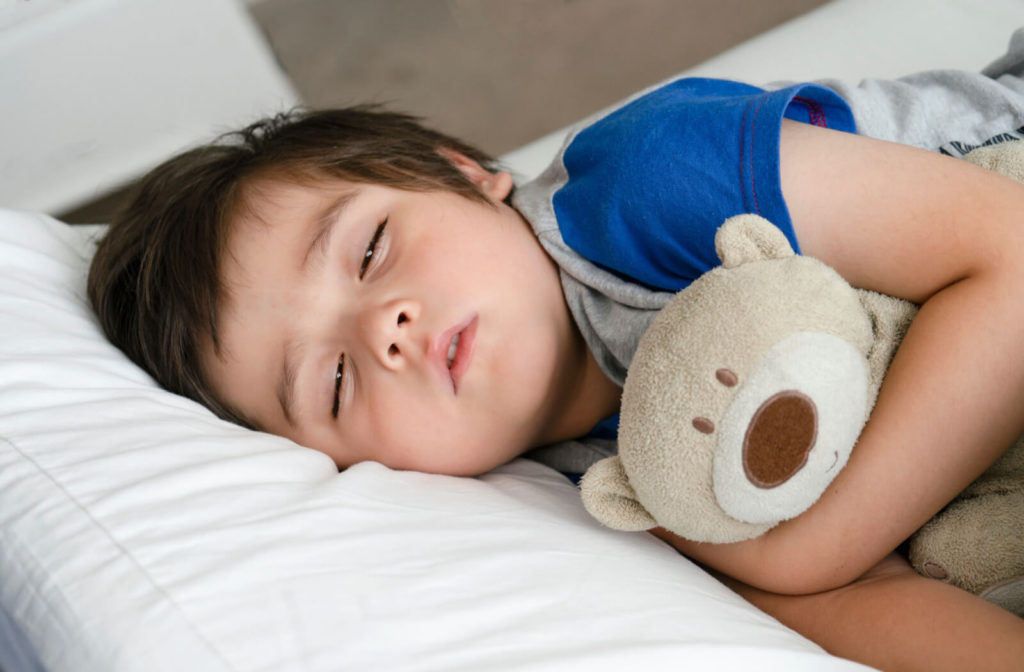Do you have dry, tired, or gritty eyes when you wake up? If this sounds familiar, you may be experiencing dry eye at night.
Nighttime dry eye can ruin a good night’s sleep and leave you feeling tired even after a full 8 hours. Fortunately, understanding what’s causing your symptoms is one of the first steps toward relieving your dry eye.
Dry eyes while sleeping at night can be caused by medical conditions, lack of tear production, medications, and low humidity in your room. If you’re waking up with dry eyes, make sure you get an eye exam so your optometrist can determine why you experience dry eye at night.
What Causes Dry Eyes at Night?
There are several reasons you might be experiencing dry eyes at night, including:
- Incomplete eyelid closure (nocturnal lagophthalmos)
- Reduced tear production during sleep
- Side effects from medications
- Dry bedroom air or low humidity
- Underlying eye conditions, such as blepharitis or meibomian gland dysfunction
- Age-related changes in tear glands
Understanding the underlying cause is key to finding the right solution for nighttime dry eye symptoms.
Dry Eye Disease
Dry eye disease affects 1 out of every 5 people. It can happen when tears are insufficiently produced or evaporate too quickly, and one or both eyes can be affected. Healthy tears are composed of 3 components:
- Water
- Oil
- Mucus
An issue with any of these layers may lead to dry eye disease, but treatments are available. More severe cases may call for prescription medication, whereas milder cases may be treated with over-the-counter medications like artificial tears.
There are 2 main types of dry eye disease that can affect you separately or simultaneously.
Aqueous Deficiency
Aqueous deficiency happens when the lacrimal glands produce less of the aqueous, or water, layer of tears. It is responsible for one-tenth of dry eye disease.
Evaporative Dry Eye
Evaporative dry eye happens when there is a blockage of the meibomian glands, reducing the quality of the oil layer of the tears. This lack of oil causes the tears to evaporate too quickly to properly moisturize the eyes.
Many factors can cause the meibomian glands to become clogged. If you don’t blink often enough, debris can build up on the edge of your eyelids, clogging the meibomian glands. Concentrating hard on a computer screen, driving, or reading can all cause you to blink less frequently.
Depending on the type and severity of your dry eye, you may experience a variety of symptoms. Some of the most common dry eye symptoms are:
- Burning, or aching eyes
- A gritty feeling or feeling like something is in your eye
- Blurred vision
- Mucus in or around the eyes
- Abnormally watery eyes
- Discomfort when wearing contact lenses
- Fatigued eyes
Dry Eyes When Sleeping
Why do some people’s dry eye symptoms get worse at night? Several factors can cause your eyes to feel sandy, dry, or as if they’re burning in the morning, including:
- Nocturnal lagophthalmos
- Insufficient tear production at night
- Medications
- Low humidity in your room
Nocturnal Lagophthalmos
Nocturnal lagophthalmos is an inability to fully close your eyelids while sleeping. The eyelids may appear to close, but they don’t form a seal that keeps moisture in. It can be brought on by:
- Head or jaw trauma
- Bell’s palsy
Insufficient Tear Production at Night
If you don’t produce enough tears at night, you won’t be able to flush the substances that can cause inflammation from your eyes while sleeping.
Tear production can decrease with age, due to certain medical conditions, or as a side effect of certain medications.
Medications
Certain prescriptions and over-the-counter medications can cause dry eyes while you sleep. These are some examples:
- Antihistamines & decongestants
- Chemotherapy medications
- Antidepressants
- Acne medications

Low Humidity in Your Room
If you’ve never seemed to have dry eyes before, it could be due to a lack of humidity in the air. In many parts of Canada, during the winter, the air becomes much drier, magnifying the symptoms of dry eye disease.
How to Prevent Dry Eyes During Sleep
Tips and tricks for preventing nighttime dry eye while you sleep are determined by the cause of your symptoms. To receive personalized advice, you should discuss your dry eye symptoms during your routine eye exam or at a separate visit. However, you can begin with these tips to avoid waking up with dry eyes:
Use a Humidifier in Your Bedroom
Dry indoor air, especially during colder months or if you use heating or air conditioning, can contribute to dry eyes at night. Running a humidifier helps keep moisture in the air and can make a big difference in your comfort.
Apply Lubricating Eye Drops Before Bed
Artificial tears or lubricating gels/ointments provide an extra layer of protection for your eyes overnight. Your optometrist can recommend eye drops and other products that work best for nighttime use.
Practice Good Eyelid Hygiene
Gently cleaning your eyelids before bed can help remove oils, bacteria, and debris that may contribute to irritation and block the glands responsible for keeping your eyes moist.
Avoid Direct Airflow
Fans, air vents, or even open windows blowing directly onto your face while you sleep can speed up the evaporation of your tears. Make sure to position fans away from your bed and consider adjusting vents to avoid direct airflow towards you.
Remove Contact Lenses Before Sleeping
Wearing contact lenses overnight can make dry eyes worse. Always take your contacts out before going to sleep unless your eye doctor has specifically prescribed extended-wear lenses.
Stay Hydrated
Drink plenty of water throughout the day to keep your whole body, including your eyes, well hydrated.
Use a Warm Compress Before Bed
Applying a warm, moist compress to your eyelids for a few minutes before bed can help improve oil gland function and promote healthy tears.
Review Your Medications
Some medications can cause or worsen dry eyes as a side effect. If you suspect your medication might be contributing, talk to your eye doctor or pharmacist about possible alternatives.
Talk to Your Optometrist for Solutions
If you experience persistent dry eye symptoms, you need to talk to your optometrist. Your optometrist can identify underlying causes of dry eye and recommend targeted treatments, such as prescription eye drops or in-office therapies.
Key Takeaways
- Dry eyes while sleeping are common. Causes can include incomplete eyelid closure, dry bedroom air, decreased tear production, or side effects from medications.
- Simple lifestyle changes can help. Using a humidifier, practicing good eyelid hygiene, staying hydrated, and applying eye drops before bed can all reduce nighttime dry eye symptoms.
- Persistent symptoms need expert care. If home remedies don’t bring relief, see your optometrist for a thorough assessment and personalized treatment options.
- Local help is available. At Willoughby Doctors of Optometry in Langley, BC, we offer advanced diagnostics and solutions for dry eyes at night, helping you get back to comfortable, restful sleep.
Ask Your Optometrist for Help with Nighttime Dry Eyes
Waking up with dry eyes can diminish the refreshing feeling of a good night’s sleep. Thankfully, there are some home remedies for dry eye discomfort, such as applying a warm compress and washing your eyelids, as well as staying hydrated, and putting moisture back into the air in your room with a humidifier.
Make an appointment with Willoughby Doctors of Optometry in Langley if your discomfort lasts more than a few days. We can perform a thorough dry eye assessment and make treatment recommendations that may be more effective than home remedies.











